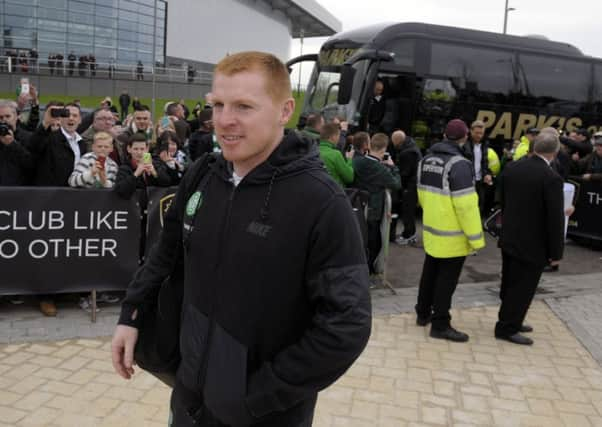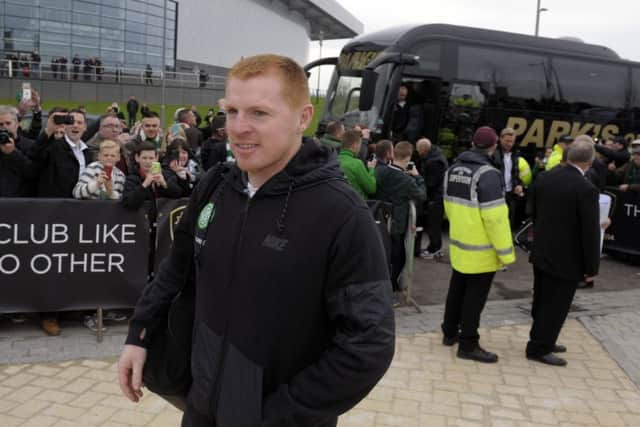Comment: Lennon and Celtic at odds over transfers


Yet, his achievements allow for no other conclusion than - just as in his seven years as a player - one which says Lennon excelled as a coach. In one area, indeed, he excelled as has no predecessor, no other manager of a Scottish club. And therein may lie a clue as to why the Irishman and the club to which he has emotional ties have parted company.
In his statement today confirming he had stepped down, the 42-year-old pointed out he had left Celtic “in a very strong position”. In no small measure that is attributable to the fact he is £17m in profit over his transfer-fee dealings. For an unequivocally successful manager of a British club, that is unheard of. Allied to the two tranches of £20m Champions League prize money earned in recent seasons, Lennon has increasingly felt short-changed when setting his budgets against the sums he has banked for the club.
Advertisement
Hide AdAdvertisement
Hide AdThis funding gap is understood to have been the source of some difficult debates with major shareholder Dermot Desmond in the past year or so, though at their Monday meeting in London also attended by chief executive Peter Lawwell an amicable exit was agreed upon. Desmond, however, sees Celtic through a different lens from Lennon. The Irish billionaire considered Rangers’ demise to be Celtic’s chance to build a cash reserve...in part in case a domestic challenge ever again materialised. Desmond wants Celtic to be the ‘model’ for all other clubs with an ability to prosper on the park aligned to a buy-cheap-and-young-and-sell-for-high profit player recruitment strategy. With actual attendances and - Champions League aside - income streams under pressure, Celtic will sell whoever, and whenever, if their values of these players are met. In these straitened times, it is an imperative that makes complete business sense and merely apes the modus operandi of Ajax.


For Lennon, though, it also placed potentially increasing limitations on his ability to build a team - and consequently make an impression on continental competition the equal of the exhilarating progress to the last 16 of the Champions League attained in 2012. A period when victory at home to Barcelona that December - his crowning triumph and one for the ages - was delivered with an ultra-smart tactical gameplan.
Lennon was utterly paranoid about failing to negotiate three qualifying rounds and miss out on the Champions League group stages, and his mood visibly darkened during these times. Yet, he forever remained a hugely considered and courteous interviewee, and an insightful character so at odds with his snarlingly public profile that a disappointment of his moving on is that it will cause “off field controversies” to be once more stirred up.
Let’s not obfuscate: Lennon was attacked, and had bullets and “viable explosive devices” sent to him in the post, because bigots have a problem with the forthright Irish Catholic that he never sought to be anything other than. His fortitude in dealing with a level of intimidation never before meted out to a public figure in this country demands respect. Not least when he has been open about struggles with depression.
Lennon revitalised Celtic on the park. He did so in a manner that seemed impossible after his third game in interim charge, following the hasty end of the calamitous Tony Mowbray regime in March 2010, ended with defeat to then First Division Ross County in the semi-final of the Scottish Cup. Handed the reins on a permanent basis that summer, he vowed to “bring back the thunder”, and he was as good as his word.
On clinching a third consecutive title two month ago, Lennon expressed his regret that he did not win the title in his first full season. That, he said, would have “silenced the critics” who would demean his subsequent championships as clinched because “there was no Rangers”. Yet, his remedial work in that first season transformed the club. For the £10m raked in from selling Aiden McGeady to Spartak Moscow, he recruited such as Gary Hooper, Fraser Forster, Kris Commons, Emilio Izaguirre, Charlie Mulgrew, Anthony Stokes and Joe Ledley.
These signings helped form the bedrock of a new Celtic that the next campaign clawed their way back from a 15-point deficit. They did so following an October day at Kilmarnock when a draw was salvaged after Lennon’s position had appeared under seriouis threat when his team found themselves 3-0 down at half-time.
Celtic were on course for a first title in four years before Rangers’ insolvency brought them a 10-point penalty in February 2012. In that campaign, Celtic strung together 17 straight league victories - the second-longest such sequence in top flight across the post-war period. Last season, Lennon presided over a remarkable, and record-setting, 14 straight league clean sheets. These feats were delivered with football that was a significant upgrade on the club’s previous successful three-in-a-row era, under Gordon Strachan.
Advertisement
Hide AdAdvertisement
Hide AdImperious in the Premiership last season, the inability of Lennon’s side to add to that trophy for the second season in three caused some grumbling among Celtic supporters. In the current climate, two Scottish Cups from nine domestic cup campaigns is a poor return. Moreover, it must be said that the home defeat in the League Cup to a bottom-of-the-second tier-and-on-their-way-to-the-third Morton last September is arguably the worst knock-out result in Celtic’s modern history. The Scottish Cup semi-final loss in 2010 also certainly features on that ignominy list and, only the width of a the goal frame struck by Shakhter Karangady late on in the Champions League play-off second leg last August prevented the Kazakhstan side inflicting the most humiliating European exit on Celtic across a half century.
Lennon’s agent Martin Riley stated yesterday that his man has said his farewells to a club within whose history and culture he will be forever embedded because four years in the post was long enough and it was time for a fresh challenge. Since Jock Stein, only Billy McNeill and Martin O’Neill have served longer stints. And of the 13 Celtic managers since Stein was deposed in 1978, probably only McNeill and O’Neill renergised the support and the club more than Lennon. It is exalted company for him to keep, but his efforts in different times demand no less.
SEE ALSO